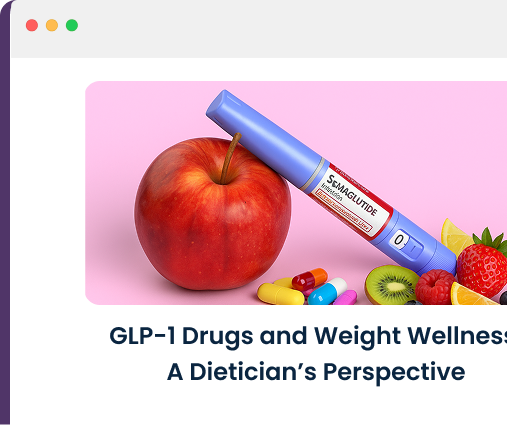Published by: Mona Raj, Clinical Dietician
Category: Weight Management | Metabolic Health | Nutrition Science
What Are GLP-1 Receptor Agonists?
GLP-1 (glucagon-like peptide-1) is a hormone naturally produced in our gut that helps regulate blood sugar, digestion, and appetite. GLP-1 receptor agonist drugs like semaglutide (Wegovy, Ozempic) and liraglutide (Saxenda) mimic this hormone’s action. These medications slow down stomach emptying, enhance satiety (fullness), and reduce hunger cues, helping individuals consume fewer calories and gradually lose weight.
A Dietician’s View: Medication Is a Tool, not a Shortcut
As a dietician, I support the clinical benefits of GLP-1 drugs but I also emphasize that true weight wellness is rooted in habit change and nutritional awareness. These medications can help kick-start progress, but they are not a long-term solution on their own.
How I Integrate GLP-1 Drugs into a Holistic Plan
1. Personalized Nutrition Counselling
People taking GLP-1 drugs often eat less — but eating less shouldn’t mean eating poorly.
- I recommend small, protein-rich meals to protect muscle mass.
- I emphasize micronutrient-rich foods (like leafy greens, nuts, and seeds).
- I support clients in managing side effects like nausea through food timing and gentle recipes.
2. Gut Health Support
These drugs slow down digestion, which can lead to constipation or bloating. I work closely with clients to:
- Include fibre (chia seeds, oats, vegetables)
- Maintain hydration
- Add fermented foods like curd, kimchi, or kanji for gut flora support
3. Behaviour Change & Mindful Eating
GLP-1 drugs suppress hunger, but they don’t address:
- Emotional eating
- Stress cravings
- Mindless snacking
Through nutrition therapy and mindful eating techniques, we explore why someone eats — not just what they eat. Long-term success comes from transforming our food relationship, not just our food intake.
4. Focus on Long-Term Sustainability
Weight often comes back if the medication is stopped without supportive changes. That’s why I equip clients with:
- Meal planning skills
- Realistic routines
- Relapse prevention strategies
My goal is to make wellness stick with or without medication.
Know the Risks & Realities
While many people lose 10–15% of their body weight on GLP-1 drugs, these medications:
- Are not suitable for everyone
- Can cause side effects like nausea, reflux, or rarely, pancreatitis
- May be expensive or inaccessible
I always advise consulting both a doctor and a registered dietician before starting any such therapy.
Final Words: Medication Can Help, But Lifestyle Heals
GLP-1 drugs are powerful tools. But in my experience, what heals and transforms lives is not just a prescription — it’s a lifestyle built on:
- Nourishing foods
- Gentle movement
- Emotional balance
- Long-term support
If you’re considering GLP-1 medication for weight loss, reach out to a qualified dietician to guide your journey. Together, we can create a plan that is safe, sustainable, and rooted in real wellness.
References
- ADA. Standards of Medical Care in Diabetes – 2024. American Diabetes Association
- Wilding, J.P.H., et al. (2021). Once-Weekly Semaglutide in Adults with Overweight or Obesity. NEJM. DOI: 10.1056/NEJMoa2032183
- ICMR-NIN. Dietary Guidelines for Indians. https://www.nin.res.in
- RSSDI. Clinical Practice Recommendations 2020. https://rssdi.in/publications/pdf/cpr-2020.pdf
- FDA. Drug Approvals – GLP-1 Agonists. https://www.fda.gov





